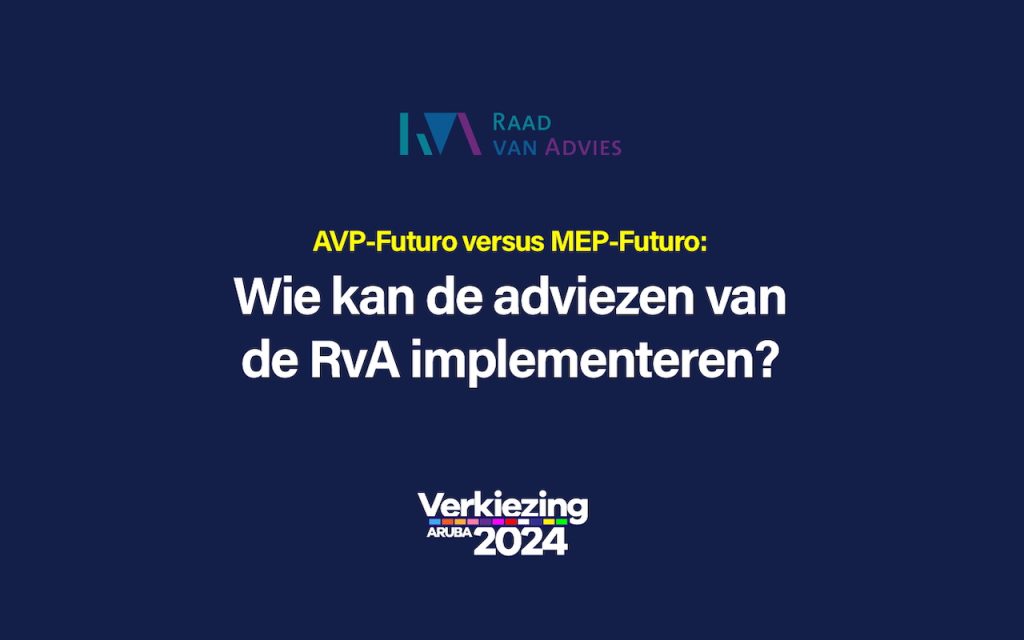
The Advisory Council (CoA) has formulated six main points for a more efficient, transparent and forward-looking government. In a political reality where the governance of Aruba is led by coalitions of MEP-Futuro or AVP-Futuro, without AVP-MEP cooperation, it is essential to analyze how each of these coalitions can relate to the recommendations.
1. Political stability and consistency
The GoA emphasizes that policy continuity and stability are needed to avoid fragmentation and restructuring in the event of changes in government.
- MEP-Futuro: This combination could potentially provide more continuity because MEP has recently governed and Futuro, as a smaller partner, can have less influence in changing portfolios. However, MEP has also introduced new ministries and rearranged policies after elections in the past.
- AVP-Futuro: AVP has a track record of strong restructuring when taking power, making consistency difficult. A partnership with Futuro may present additional challenges due to the need to satisfy smaller coalition partners, often resulting in new posts.
Conclusion: Both coalitions should strive for a national policy plan that covers a longer term, regardless of who governs.
2. Handling corporatization responsibly
The COA calls for a strategic roadmap for corporatization and governance of government entities.
- MEP-Futuro: MEP has often emphasized social justice and sustainability in its policies. This can contribute to the careful corporatization of services. The challenge lies in strengthening governance, where Futuro may be able to contribute by bringing a focus on transparency as a new party.
- AVP-Futuro: AVP has historically placed more emphasis on market-based solutions and economic growth. This can help in corporatizing tasks, but governance remains a challenge, given past criticism of political appointments.
Conclusion: MEP-Futuro may have more potential to put public interests at the center of corporatization, but both coalitions need to improve governance.
3. Reforming the grant landscape.
The CoA criticizes the fragmented and inefficient grant landscape and calls for consolidation and professionalization.
- MEP-Futuro: MEP's focus on social projects may resist reducing subsidies. Futuro, however, as an independent party, can push for efficiency and a more data-driven approach.
- AVP-Futuro: AVP tends to be more pragmatic about cost cutting and therefore may be more inclined to reduce or restructure subsidies. This may clash with Futuro's social outlook, depending on their vision.
Conclusion: Both coalitions may have difficulty reforming subsidies without causing social unrest. AVP-Futuro may be more cost-effective, while MEP-Futuro better safeguards social interests.
4. Transparency and appointments
The COA advocates merit-based appointments and less political interference.
- MEP-Futuro: MEP has recently announced governance measures, but political appointments remain a sensitive issue. Futuro, as a small partner, can argue for depoliticization, but the degree of influence remains uncertain.
- AVP-Futuro: AVP has a history of political appointments that were often criticized. Futuro's support for transparency could potentially improve the culture in this coalition, but the balance of power is crucial here.
Conclusion: Neither coalition has so far shown to completely depoliticize appointment procedures, but Futuro can press for change in either case.
5. Vision and long-term policy
The GoA calls for a broad-based, consistent vision beyond the four-year political cycle.
- MEP-Futuro: MEP has a tradition of plans focused on social justice and sustainability, which is in line with the CoA's opinions. Futuro can contribute by bringing in a more innovation-oriented vision.
- AVP-Futuro: AVP often focuses on economic growth and infrastructure, which can provide important elements for a long-term strategy. However, consistency beyond one's own reign remains a challenge.
Conclusion: MEP-Futuro seems more in line with the COE recommendations on sustainability, while AVP-Futuro may be stronger in economic diversification.
6. Countering financial deficits
The COE stresses the need to address financial problems in government limited liability companies and grants.
- MEP-Futuro: While MEP prioritizes public service, there is a risk that financial discipline does not receive enough attention. Futuro can play a role here as a driver of financial reforms.
- AVP-Futuro: AVP often takes an economically pragmatic approach, which can help address deficits. However, the social impact of hard cuts can lead to criticism of Futuro.
Conclusion: AVP-Futuro is better positioned to address financial problems, while MEP-Futuro has more focus on preserving social services.
Final balance
Both coalitions have strengths and weaknesses with respect to the BoA's opinions. MEP-Futuro can perform more strongly in safeguarding public interests and sustainability, while AVP-Futuro is likely to be more decisive in addressing financial problems and economic diversification. However, both coalitions will have to make substantial efforts to effectively meet the high standards of the COE.
Conclusion
In general MEP-Futuro most compatible with the COE recommendations because of their focus on long-term vision, sustainability and public interest.

